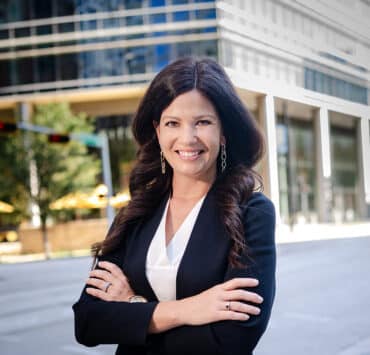|
Getting your Trinity Audio player ready...
|
If you’re a born litigator considering going in-house, you should talk to Felix Sharpe. Sharpe went to firm Dinsmore & Shohl for one reason and one reason only: He wanted to try cases. Over six years, Sharpe argued brand protection, commercial issues, torts, product liability, and a variety of other cases, billing a few 24-hour days in the process. Sharpe got first-, second-, third-, and fourth-chair jury trial opportunities that he got to push through both state and federal courts.
So why did a natural trial lawyer agree to take on in-house counsel roles for Humana Inc.? The decision wasn’t easy, but Sharpe’s first contact at his firm had moved to Humana. Sharpe knew that if he gave it a chance, he would find a way to thrive in-house—but only if he elected not to take on a partnership at his firm.
“I wasn’t comfortable with that much change, to be honest,” Sharpe says. “I didn’t know what the other side would be like. But after just a little bit of time, I realized that the work would be very similar—just from a different perspective.”
The lawyer says that in a law firm, he felt like the pilot, where he was singularly responsible for moving his work ahead. In-house, Sharpe likens himself to an air traffic controller. He’s had to grow a different kind of skill set to align objectives in litigation with the overall objectives at Humana.
“I cut my teeth on those domestic violence order cases, getting a file on Friday and having to show up at a hearing on Monday morning. I learned how to prepare witnesses, gather as much evidence as I could, and cross-examine witnesses. It’s valuable work that makes you feel good.”
Felix Sharpe
When it comes to brand protection, Sharpe says his job is providing proper “bedside manner” for nurses and care providers who have done their very best in difficult situations. The difference between a litigator who does their work perfectly and a litigator who does the same while emotionally supporting their client through one of the hardest periods of their lives is the difference between a good lawyer and a great one.
“I tell those nurses that I have their back,” Sharpe explains. “I understand they’re scared, and they’ve never met me before. But me, this outside lawyer I’ve hired, and our little team are there for you. I give them my cell phone number and tell them they can contact me at any time. In this world, it seems like no good deed goes unpunished, and I want our people to know that we stand behind them and the amazing work that they do.”
While those cases can be more emotional and, frankly, adversarial at times, Sharpe also handles provider litigation that (mostly) seems to keep the gloves on. The adversarial part of the process is much more procedural, Sharpe explains. Instead of having a plaintiff attorney getting confrontational with him in person, he might be met with fifty individual lawsuits, when the attorneys involved could have simply consolidated the case into a single complaint.
“That kind of litigation is much more strategically business-minded,” Sharpe says. “I wanted to be a litigator, and I get to handle interesting cases and issues across the spectrum.”
And while Sharpe may not be arguing as many cases in court these days, he has a long history of providing help and support to communities that need all the help they can get.
For instance, the lawyer has long been involved with nonprofit legal services provider the Legal Aid Society. He remembers a woman he represented in a domestic violence case, who ultimately divorced her husband of decades. Sharpe didn’t want the woman to have to turn to another attorney to work through divorce proceedings, so he handled them himself.
Finding a Way
While Felix Sharpe says there are a million mothers who have done the same thing, he still expresses pride that he made it through law school as a single father. He couldn’t say how he got any studying done while posted up at a trampoline park with his young son, but he found a way. Sharpe says a wonderful babysitter, his grandparents, his mother, and one of his very best friends did everything they could to support him as a young father.
“I’m not sure how I did it, but I didn’t give myself any other choice,” Sharpe says. “There was no other choice but to raise my son.”
Sharpe has also worked extensively on behalf of the Ronald McDonald House. It’s an organization he was exposed to early in his career, even before he was a practicing attorney.
And while Sharpe’s pro bono opportunities may not be as numerous as they were when he was a firm lawyer, he still regularly takes part in events and communications on behalf of the Legal Aid Society and the Leadership Council on Legal Diversity.
Those pro bono opportunities gave Sharpe even more courtroom experience, with the added satisfaction of knowing he was helping people who couldn’t otherwise afford legal representation.
“Young lawyers want to get experience, and you’re just not going to get that as a first-year,” Sharpe says. “I cut my teeth on those domestic violence order cases, getting a file on Friday and having to show up at a hearing on Monday morning. I learned how to prepare witnesses, gather as much evidence as I could, and cross-examine witnesses. It’s valuable work that makes you feel good.”
“It is always a pleasure to work with Felix. He is smart, strategic, and a true collaborator. In approaching complex legal issues, Felix works hard to understand business goals in guiding Humana’s defense.”
–Amanda L. Genovese, Partner, Seyfarth Shaw LLP

